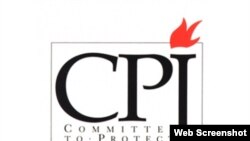Media rights group the Committee to Protect Journalists (CPJ) called Wednesday for the release of a South Sudanese reporter who allegedly has been in detention for nearly three weeks.
The CPJ said in a statement that Radio Miraya reporter, George Livio, was detained on August 22 in Wau.
The CPJ’s East Africa representative, Tom Rhodes, said that under South Sudan’s penal code, the authorities must either release Livio or take him to court within 24 hours of detaining him.
“Our main concern is that he has been held for over two weeks or nearly three weeks actually without any charges or without being presented to court," Rhodes told South Sudan in Focus.
"So we are calling on the security agencies to do that especially in light of the recent passage of the media laws.”
President Salva Kiir on Tuesday signed three media bills into law, which are supposed to give all citizens, including journalists, access to official information, set up an independent oversight committee ofr the media and start an independent national public service broadcaster.
Livio has not been charged with any offense, but Rhodes said that Western Bahr el Ghazal state information minister, Derrick Alfred, told CPJ that security agents monitored Livio’s communications and accused him of collaborating with rebels. Livio’s family and his employers said the allegations are not true.
Over the weekend, South Sudan Information Minister Michael Makuei told journalists at a forum about the role of the media in nation-building that journalists who report the views of rebels led by former vice president Riek Machar are "rebels and agitators" and could face prosecution. Makuei made a similar statement in March, when he said it was a criminal offense to broadcast or publish interviews with rebels.
Rhodes says journalists in South Sudan who talk to the armed opposition are merely trying to do their job and report both sides of the biggest story in the country at the moment – the nine-month-old conflict.
Zero tolerance
"We are really seeing a kind of zero tolerance policy towards objective and professional reporting in South Sudan due to this conflict and my fear is that things may get worse before they get better,” he said.
Livio was moved from Wau to Juba two days after he was detained. He has been denied legal aid and contact with family. His father, Geligo Livio, who is an economic adviser for the Western Bahr el Ghazal state government, said the family does not know where he is.
"We only hear that he is in the hands of the security... we don’t know now what are the charges against him. So far I have been struggling to get in touch with him by phone, but it cannot go through," Geligo Livio said.
The CPJ says it knows of at least 10 journalists who have been threatened or harassed by security officials since the start of the conflict in South Sudan. Because of what the CPJ calls "a steady flow of intimidation," many journalists in South Sudan are self-censoring their work and not reporting on key issues at a time when the country needs accurate and truthful reporting.
